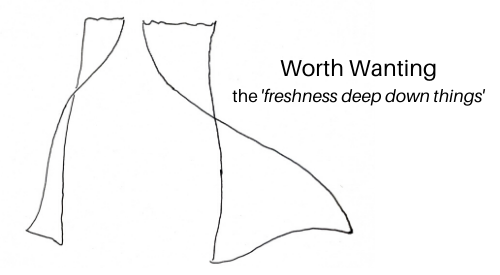
There’s a scene in Mozart’s Don Giovanni highlighting the challenge that lying, hiding and pretending represent to our need, individually and together, to make good decisions. Donna Anna asks Don Giovanni for help finding the man who murdered her father after attempting to rape her, not recognizing Don G. as that person. At the same time, Donna Elvira, a betrayed former lover of Don G., loudly calls out Don G. as a serial rapist (which he proudly is). Through all this, Don Giovanni is attempting to retain the trust of Donna Anna (he still wants to have her) while explaining away Donna Elvira (seen above) as raving mad. All this happens simultaneously as only opera can portray it with great singing and acting. What will Donna Anna believe?
This scene raises a question for me here: what is the relationship between freshness, transcendent freshness, and lying, hiding (or concealing) and pretending which are common, often malignant, practice sin the mundane world? I ask this not just with reference to encountering. The whole world today is struggling with these dissimulation practices, particularly as combined in conspiracy theories.
The mundane world of limited resources and unlimited ambition is the theater of lying, hiding and pretending as strategies of power, profit or perpetuation. As inhabitant of the mundane, we are taught and have to learn how to discern who or what to trust, because while dramas of deceit are sometimes benignly entertaining, they are often also malignly tragic.
Three questions: Does freshness ever engage in lying, hiding or pretending? The answer: no, never. Does freshness ever police lying, hiding or pretending in encounters, protecting participants from false openness, and insincere commitment to common cause with their livingness? The answer: no, with qualification. Does freshness help us learn to discern the trustworthiness of messages, set-ups and individuals? Yes, absolutely.
To the first question: The activity of freshness in the mundane is to invite us to interact with us in encounters to create occasions of communion which are lasting in the transcendent. That’s it: wooing and co-working. Freshness doesn’t pronounce, doesn’t conceal, doesn’t pretend. It is simply an active, potent presence doing what it does. What the consummation in the transcendent will be of the encounters which freshness is ‘minting’ there is not yet fully determined, so no freshness makes no claims about it, except that it will manifest itself then as it does now.
To the second question: in a compound encounter both participants exhibit openness or sincere commitment to common cause. If either one doesn’t, the encounter is solo and limited to the other. The false or insincere is simply not included in the lastingness of the encounter if freshness is not given access.
It would be nice to assign freshness the role of the judge of truth and sincerity in encounters, but freshness doesn’t judge. That’s our mundane responsibility. Encounters are risky and we can be deceived, tricked, scammed, betrayed in encounters as in any interactions, and freshness does not bang the gavel.
That said, freshness does continually actively woo us, all parties, into and through true and sincere encounters. (And we’re wooed into risking encountering again after disappointment.) Also, freshness encourages kin groups, neighborhoods, organizations, institutions and traditions (KNOITs) which foster trust spaces wherein people more readily invite and accept encounters.
Finally, to the third question, freshness helps us learn to better discern. There’s lots of advice available to help us detect lying, hiding and pretending, much of it very useful. Watching the eyes, listening to turns of phrase, noting omissions, picking up on inconsistencies, are just some of the ways we as members of societies in the mundane world protect (and amuse ourselves.)
In encounters, we make common cause with the livingness of others, meaning we are attending to the deepest aspects of each other (and ourselves): each person’s sense of self, their sense of others and othernesses, and the relationship of the two aspects of who we are (alitorium and suitorium). To go below the surface of someone’s tells and contortions to the fundamental level of their livingness (and to make common cause with it) is to approach the truth. Facilitating this is what freshness is active at in encounters.
Reflecting on our encounters, and on ourselves as encounterers, is a process of learning to discern, which can help us in all circumstances.
After watching Don Giovanni shuttle between the two women, Donna Anna and Donna Elvira, to reassure one and silence the other, he exits with a promise spoken in such a way that Donna Anna, at last and suddenly, recognizes him through his voice as the one who had attacked her in the night. “He is the one.”
We enjoy the desperate efforts of Don Giovanni to extricate himself from the situation of his own making, but are relieved when it becomes clear that his victims do see through his web of deceit to some incontrovertible truth. It’s only the beginning, though; Don G. doesn’t get his full comeuppance until he meets the ghost of the man he murdered and is sent (operatically) into the fiery abyss.
Seeing through lies, concealments and pretences is mundane business we must engage in regularly, but freshness does help us learn to discern.
